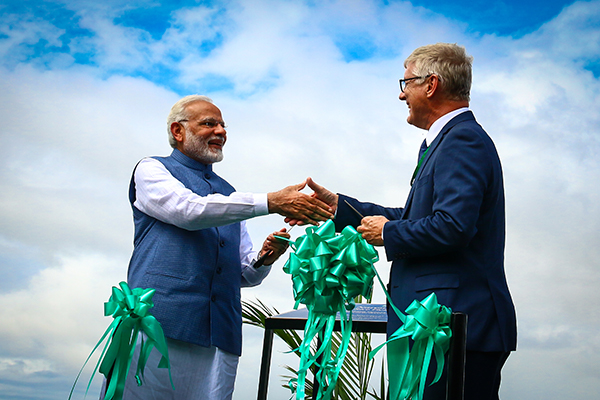Prime Minister Narendra Modi furthers innovation for the Indian rice sector

Los Baños, Philippines – Nov 13 2017 – Prime Minister Narendra Modi inaugurated the Resilient Rice Field Laboratory at the International Rice Research Institute (IRRI) today.
While in the Philippines for the ASEAN Summit meetings, Modi spent time at the International Rice Research Institute discussing agriculture innovations and research advances for the rice sector. He met with several prominent agriculture scientists and discussed issues of climate change, the need for more farmer education and the growing role of women farmers in the rice sector.
The Resilient Rice Field Laboratory forms part of a three-prong approach to developing new, high-yielding, stress-tolerant rice varieties that are well-suited and well-adopted by farmers across the region.
Primary scientific research conducted in the Field Laboratory to develop stress-tolerant rice varieties is then transferred to IRRI’s Centre of Excellence at the IRRI South Asia Regional Centre in Varanasi, Uttar Pradesh for further localized testing.
“The Varanasi Centre would help increase farmers’ income by enhancing and supporting rice productivity, reducing cost of production, value addition, diversification, and enhancement of farmers’ skills,” said Prime Minister Modi.
From the IRRI South Asia Research Centre in Varanasi, a broad technology adoption network enables IRRI and its local partner, the Indian Centre for Agriculture Research to bring these innovations to farmers groups. This ensures innovations are tailored to farmers’ needs and quickly adopted--creating a responsive, real-time laboratory dedicated to the development of high quality, profitable rice varieties for those in need.
Furthermore, the lessons learned in these facilities have the potential to benefit farmers globally. Through its global network of over 900 research and development partners, IRRI is able to work to ensure key knowledge and technology is tailored to meet the needs of the world’s 145 million rice farmers.
“India’s demonstrated leadership in agriculture and agricultural science in the region is a real benefit to farmers not only in India but also across SAARC, ASEAN and Sub-Saharan Africa in mitigating the risk of climate change for rice farmers,” said Dr. Matthew Morell, Director General of the International Rice Research Institute, “The establishment of research facilities and Centres of Excellence such as this one and the one in Varanasi is a testament to the Indian government’s commitment to South-South collaboration as a key mechanism for meeting food security needs and improving the livelihoods and welfare of farmers--the farmers who play a critical role in transforming the global rice sector into an efficient, highly-productive economic driver of the region.”

In Asia, where most of the world’s rice is grown, about 20 million hectares of rice land is prone to flooding. Crop losses from flooding affect rice farmers every year, increasing the burden of poverty they must bear. In India and Bangladesh alone, more than 5 million hectares of rice field are flooded during most of the planting seasons.
The research planned for the new laboratory will concentrate on developing rice varieties that can be successfully grown in flood and salinity prone areas, decreasing risks for farmers involved in rice production in some of the poorest regions of India and Asia.